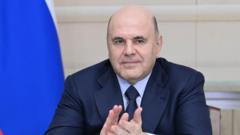A lack of formal tracking by the Russian Ministry of Defense leaves families of missing soldiers in turmoil. With no organized effort to locate their loved ones, these families navigate their grief in isolation, often relying on unofficial sources for information.
The Silent Crisis: Families of Missing Russian Soldiers in Ukraine Face Uncertainty

The Silent Crisis: Families of Missing Russian Soldiers in Ukraine Face Uncertainty
Many families of Russian soldiers who have gone missing in Ukraine are left in distress as the government provides little to no information.
In recent months, the distressing reality faced by families of missing soldiers from the ongoing Russia-Ukraine war has come to light. One such case is that of Elvira Kaipova, a mother grappling with the uncertainty of her son Rafael's fate, a soldier who was deployed in Ukraine. After months of unanswered inquiries regarding his wellbeing, she finally received the shattering news that her son had gone missing on November 1 — not from official channels, but from a Telegram group aimed at supporting military families.
The officer in charge of family liaison, Aleksandr Sokolov, informally conveyed the devastating message: “We lost your son." This exchange is emblematic of a broader, systemic failure within the Russian military to account for their troops. Families are often met with vague responses about their loved ones being on active duty, only to discover the harsh reality — a lack of structured communication and search efforts.
Reports indicate that since the invasion of Ukraine in February 2022, many families have endured similar experiences where the Russian Ministry of Defense has failed to establish a formal mechanism for finding missing soldiers. Consequently, relatives are left alone to bear the weight of uncertainty, often without any guidance or assistance from the government.
The absence of organized tracking and accountability is alarming not only for families seeking closure but also sheds light on the broader implications of soldier welfare and military transparency in Russia. Military analysts and private organizations supporting these families have expressed concern over the long-term impact of these missing soldiers and the emotional toll it takes on their families.
The situation remains dire as the Ministry of Defense has refused to comment, leaving families to fend for themselves in the dark, compounded by the silence and lack of empathy from official structures. While emotions run high and the search for closure continues, families are forced to navigate an emotional landscape of loss and uncertainty, exemplifying a poignant crisis beneath the larger umbrella of the ongoing conflict.


















